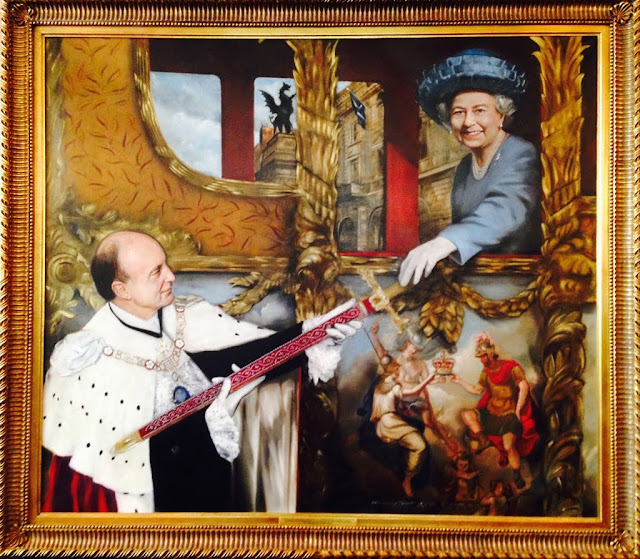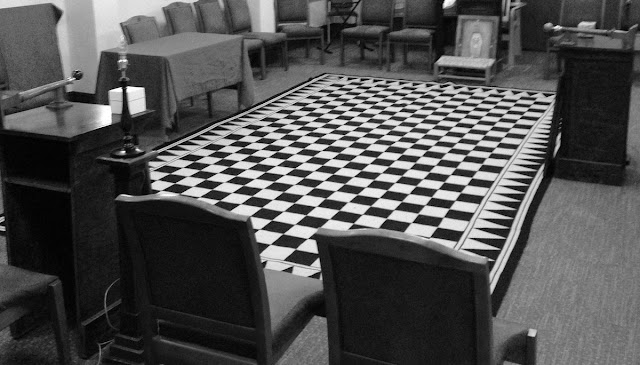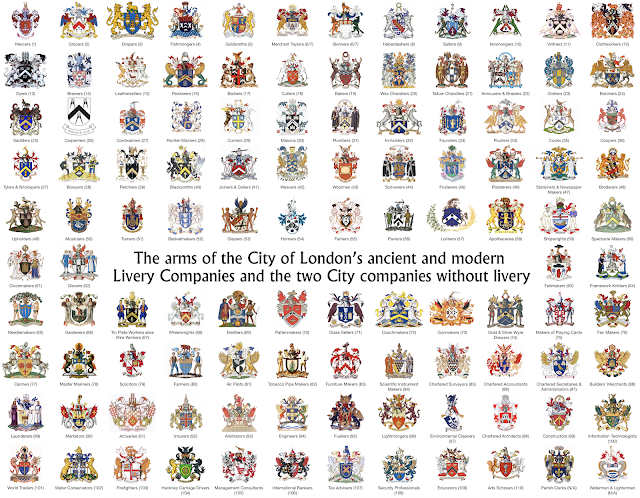Results of the #HeraldryQuiz on Twitter
Heraldry is an omnipresent aspect of the City of London and its many Livery Companies, not least because of the presence in the City of Her Majesty's College of Arms on Queen Victoria Street but also because the oldest civic arms in the United Kingdom are those of the City and the oldest corporate arms are those of the Drapers' Company. Every Lord Mayor and Sheriff of the City of London has his or her coat of arms as do each of the City's Livery Companies.
If you are considering petitioning for your own coat of arms in the United Kingdom then @CityandLivery is hosting a grant of arms workshop in London on 19 September that may interest you.
July's #HeraldryQuiz hosted by @CityandLivery on Twitter posed a series of questions that explore some of the many myths and misconceptions that persist as 'common knowledge' about heraldry. The results of the quiz and the correct answer to each of the questions are as follows:
Question 1: Do you have to be Royalty, a Lord or a Knight to be granted a coat of arms?
Yes - 3%
No - 97%
Not Sure - 0%
Correct answer: No.
It has never been the case that one has to be of royal blood, a peer of the realm or a knight in order to be granted arms by the crown in the United Kingdom. That said, royalty, peers and knights automatically meet the requirement to be granted arms. Anyone who can show sufficient eminence may petition the crown for a grant of arms in the Commonwealth Realms.
Question 2: Is a 'family crest' the same thing as a coat of arms?
Yes - 4%
No - 96%
Not sure - 0%
Correct answer: No.
There is no such thing as a 'family crest' although the term is widely used and abused as a synonym for a coat of arms. The crest is just one element of an armorial achievement and it is not granted to a 'family',
Question 3: Does the motto below a coat of arms have to be in Latin?
Yes - 25%
No - 75%
Not sure - 0%
Correct answer: No.
There is no requirement to have a motto in English heraldry, neither does the motto have to be in Latin. There are plenty of examples of mottos in English and other languages. The situation is slightly different in Scottish heraldry where the motto forms part of the legal grant but even there is does not have to be in Latin.
Question 4: Are coats of arms linked to surnames?
Yes - 57%
No - 39%
Not sure - 4%
Correct answer: No.
This is probably the most often repeated misconception about heraldry, i.e., that there is a 'coat of arms for a surname'. This misconception allows the dubious trade known as 'bucket shop heraldry' (see next question) to survive by peddling the myth that there is a coat of arms for the surname Smith, Jones, Williams, etc. Coats of arms are granted to individual named persons and pass down the male line through the generations. If Mr Arthur Smith of No. 1 Acacia Avenue, Much Piddling-on-the-Green is granted arms the crown then those arms may be used by his sons, grandsons and so on. This does not mean that every Mr Smith in the world has a right to use those arms any more than they have the right to live in Mr Arthur Smith's house. Arms are a form of intellectual property granted to a single, named person (or body corporate).
Question 5: Can you buy your family coat of arms or crest from a website or shop?
Yes - 4%
No - 92%
Not sure - 4%
Correct answer: No.
The dubious trade of selling 'your family coat of arms' (or crest) from a website or shop is known as Bucket Shop Heraldry. It is as legitimate as snake oil vending. At the very best a bucket shop (or website) simply sells you a copy of a picture which confers no right to claim or use that picture as your coat of arms, at worst it may be engaged in heraldic fraud. Either way it is a trade best avoided unless you wish to make voluntary donations to the lifestyle of those who profit from such ventures.
Question 6: Can anyone with a coat of arms add supporters either side of their shield?
Yes - 20%
No - 72%
Not sure - 8%
Correct answer: No.
Supporters are the beasts (real or imagined) or humans that stand either side of the shield in a coat of arms and hold (or support) it. Supporters are granted only to persons of high social rank (knights and above) either for their lifetime or as a hereditary element of their armorial achievement in the case of a Baronet, Hereditary Peer or member of the Royal Family.
Question 7: Can women be granted arms in their own right?
Yes - 92%
No - 4%
Not sure - 4%
Correct answer: Yes.
There is no restriction on women being granted arms in their own right. A quick examination of the arms of Queens of England, royal princesses and female benefactors of churches, cathedrals and university colleges over many centuries will confirm that fact.
Question 8: Is it lawful to display someone else's arms as if they are your own?
Yes - 10%
No - 90%
Not sure - 0%
Correct answer: No.
Arms are a form of intellectual property, to misuse them, especially to claim as your own the arms of another person is unlawful. Referencing someone else's arms is perfectly acceptable, for example you can take a photo of someone's arms and put it on your website so long as you state whose arms they are and make no claim they are yours.
Question 10: Which of the following is the heraldic authority for the Isle of Man?
High Court of Tynwald - 41%
House of Keys - 18%
College of Arms - 36%
Court of Lord Lyon - 5%
Correct answer: College of Arms
The College of Arms is the heraldic authority for England, Wales, Northern Ireland, The Channel Islands, The Isle of Man. Gibraltar and all British Overseas Territories. Scotland has its own heraldic authority (The Court of Lord Lyon) as does Canada.
Question 11: Is an heraldic badge the same as a crest or shield?
Yes - 8%
No - 84%
Not sure - 8%
Correct answer: No.
An heraldic badge is a separate thing to the shield and the crest. It is typically used the by the followers of the person to whom the grant of arms is made.
Question 12: Can the Monarch grant arms without the advice of her ministers?
Yes - 73%
No - 18%
Not sure - 9%
Correct answer: Yes.
The Monarch is the fount of honour and granting arms is a royal prerogative exercised on the Monarch's behalf by the Earl Marshal. The Monarch can and does grant arms directly, most typically to members of the Royal Family.
Question 13: Displaying a coat of arms is subject to an early tax on armorial achievements?
True - 35%
False - 50%
Not sure - 15%
Correct answer: False.
It used to be the case that there was a tax on displaying armorial achievements but the relevant legislation was repealed in the mid-1940s.




Comments
Post a Comment